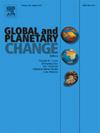Suppressed AMOC multidecadal variability by freshwater flux change in the Community Earth System Model version 1.0
IF 4
1区 地球科学
Q1 GEOGRAPHY, PHYSICAL
引用次数: 0
Abstract
The multidecadal variability of Atlantic Meridional Overturning Circulation (AMOC) significantly impacts various climate phenomena, yet the role of ocean surface freshwater flux in this variability is not fully understood. Through experiments with and without surface freshwater flux adjustment under pre-industrial conditions based on the Community Earth System Model version 1.0, we demonstrate that active freshwater flux variability, particularly sea ice melt, can suppress the amplitude and period of the AMOC multidecadal variability by influencing sea surface salinity and density. Specifically, active freshwater flux rapidly shifts density anomalies between the AMOC positive and negative phases. When the AMOC is in its positive phase, the previously weaker state can induce negative surface temperatures in the deep water formation region. This temperature anomaly raises sea level pressure and introduces westerly anomalies over the subpolar North Atlantic, promoting sea ice expansion and increasing sea ice melt. The increased sea ice melt reduces surface salinity, driving the AMOC into its negative phase. This process is also responsible for suppressing the amplitude of the AMOC variability. The opposite process occurs when the AMOC is in its negative phase. Our findings highlight the critical role of freshwater flux in affecting the AMOC multidecadal variability in both current and changing climates.
群落地球系统模型1.0版淡水通量变化抑制AMOC的多年代际变化
大西洋经向翻转环流(AMOC)的多年代际变率显著影响各种气候现象,但海洋表面淡水通量在这种变率中的作用尚不完全清楚。通过基于群落地球系统模型1.0版的工业化前条件下有地表淡水通量调整和没有地表淡水通量调整的实验,我们证明了活跃的淡水通量变率,特别是海冰融化,可以通过影响海面盐度和密度来抑制AMOC多年代际变率的幅度和周期。具体而言,活跃的淡水通量在AMOC正、负相位之间迅速转移密度异常。当AMOC处于正相时,先前较弱的状态会导致深水地层区域的表面温度为负。这种温度异常提高了海平面压力,并在北大西洋亚极地上空引入了西风异常,促进了海冰的扩张和海冰融化的增加。海冰融化的增加降低了地表盐度,使AMOC进入负值阶段。这一过程也抑制了AMOC变异性的幅度。当AMOC处于负相时,则发生相反的过程。我们的研究结果强调了淡水通量在当前气候和变化气候中影响AMOC多年代际变率的关键作用。
本文章由计算机程序翻译,如有差异,请以英文原文为准。
求助全文
约1分钟内获得全文
求助全文
来源期刊

Global and Planetary Change
地学天文-地球科学综合
CiteScore
7.40
自引率
10.30%
发文量
226
审稿时长
63 days
期刊介绍:
The objective of the journal Global and Planetary Change is to provide a multi-disciplinary overview of the processes taking place in the Earth System and involved in planetary change over time. The journal focuses on records of the past and current state of the earth system, and future scenarios , and their link to global environmental change. Regional or process-oriented studies are welcome if they discuss global implications. Topics include, but are not limited to, changes in the dynamics and composition of the atmosphere, oceans and cryosphere, as well as climate change, sea level variation, observations/modelling of Earth processes from deep to (near-)surface and their coupling, global ecology, biogeography and the resilience/thresholds in ecosystems.
Key criteria for the consideration of manuscripts are (a) the relevance for the global scientific community and/or (b) the wider implications for global scale problems, preferably combined with (c) having a significance beyond a single discipline. A clear focus on key processes associated with planetary scale change is strongly encouraged.
Manuscripts can be submitted as either research contributions or as a review article. Every effort should be made towards the presentation of research outcomes in an understandable way for a broad readership.
 求助内容:
求助内容: 应助结果提醒方式:
应助结果提醒方式:


